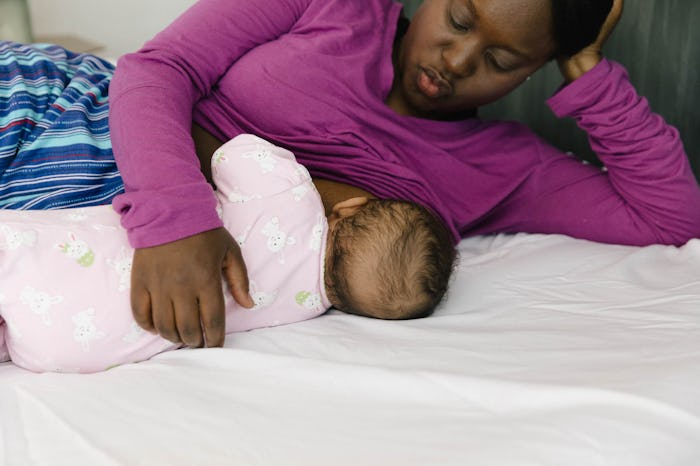When I first started breastfeeding my daughter, I felt like I was in unknown territory. I ended up learning so many new things, a few through my lactation support people and the rest from experience, especially in the first few weeks. I realized how important a good latch was, because when my daughter wasn't latched on properly, we would both get irritated. If you are breastfeeding and feel like something isn't right, you might wonder, "how do I know if my baby has a bad latch?" Turns out, there's a lot more that happens than just irritation.
An improper latch can affect your breasts and your baby. If your baby has a bad latch, the first obvious sign will be breast and/or nipple pain, lactation consultant Tera Kelley Hamann tells Romper. You may also find your nipples looking discolored or blanched, and not being round when your baby pops off.
International Board Certified Lactation Consultant (IBCLC) Julie Gladney tells Romper that along with shooting pain in the breasts, chronic plugged ducts and multiple cases of mastitis in a short time are also signs of a bad latch.
Think you can power through? Here's the thing — an improper latch is more than just painful; it can lead to inadequate feedings. Hamann says that your baby might become fussy and unsettled after feedings, they won't gain weight well, and they may not produce enough dirty diapers. She adds that because babies with a bad latch often are gassy and fussy, they get improperly diagnosed with reflux. "It's not truly reflux, just that babe is swallowing a lot of air because they can't latch properly," Hamann says. She suggests coordinating your lactation consultant's visit with your pediatrician anytime that reflux is diagnosed.
IBCLC and Registered Nurse (RN) Jennifer Passwaters tells Romper that babies with oral ties can also have issues maintaining their latch. She notes that these babies often make popping noises or clicking noises when feeding and that their upper lips may also have blisters, sometimes in the pattern of cobblestones.
Still unsure of your baby's latch? According to IBCLC and RN Angie Mann Natero, a good latch should be pain and injury free on the mom's end. She also tells Romper that a good latch includes adequate milk transfer, which you'll see in a baby thriving with normal weight gain and diaper counts.
If you feel like your baby has a bad latch, enlisting the support of a lactation consultant can help. Just like most things in life, breastfeeding will get easier with time, experience, and the right support. It may be as simple as trying a new position or having your baby's tongue or lip tie corrected. But it's best to find out for sure so you and baby can have a successful, pain-free breastfeeding experience.
